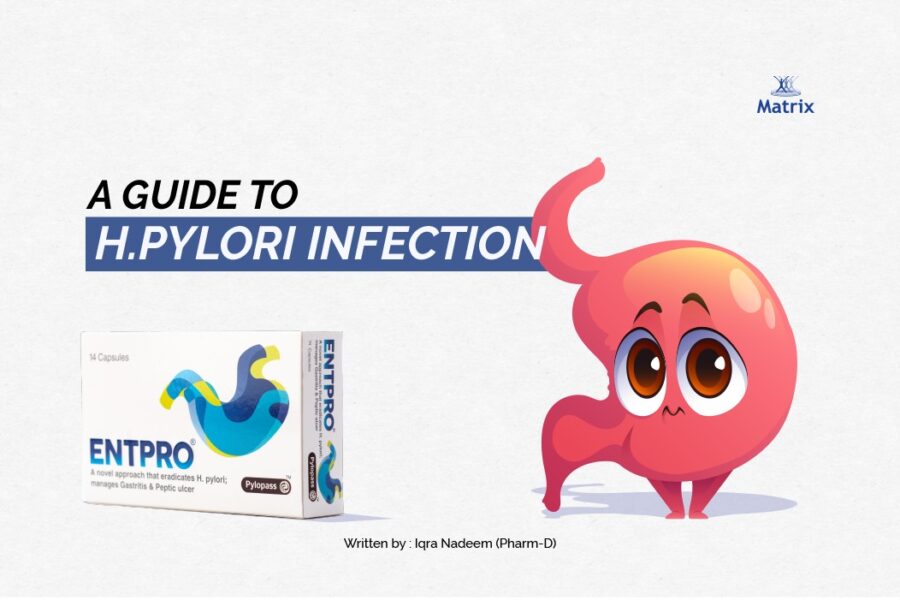
What is diarrhea?
Diarrhea is a condition in which a person has loose, watery stools. It is a common digestive problem that can be caused by a variety of factors, such as infections, food poisoning, or certain medications. Diarrhea can also be a symptom of other underlying health conditions, such as inflammatory bowel disease or celiac disease.
In what ways are normal diarrhea and severe diarrhea different?
Normal diarrhea is a common digestive problem that can cause loose, watery stools and other symptoms, such as abdominal pain or cramping. It is often caused by infections, food poisoning, or certain medications.
Severe diarrhea is a more serious form of diarrhea that can cause dehydration and other complications. Frequent, watery stools, abdominal pain or cramping, and a feeling of urgency to have a bowel movement usually characterize it.
Infections, food poisoning, and other underlying health issues can all produce severe diarrhea. It may require medical treatment, such as antibiotics or intravenous fluids, to manage the symptoms and prevent complications.
If you are unsure whether your diarrhea is normal or severe, it is always best to consult a doctor. They can provide a diagnosis and recommend the best course of treatment to help manage your symptoms and prevent complications.
What causes diarrhea?
There are many different factors that can cause diarrhea, including:
- Infections: Diarrhea is often caused by infections from bacteria, viruses, or parasites. These can be spread through contaminated food or water, or through close contact with someone who is infected.
- Food poisoning: Consuming food or drinks that are contaminated with bacteria, viruses, or toxins can cause diarrhea. This is known as food poisoning, and it can happen if food is not stored or cooked properly.
- Medications: Some medications, such as antibiotics and laxatives, can cause diarrhea as a side effect.
- Other health conditions: Diarrhea can also be a symptom of underlying health conditions, such as inflammatory bowel disease, celiac disease, or lactose intolerance.
- Stress: Emotional stress can sometimes cause diarrhea, as can physical stress from intense exercise or illness.
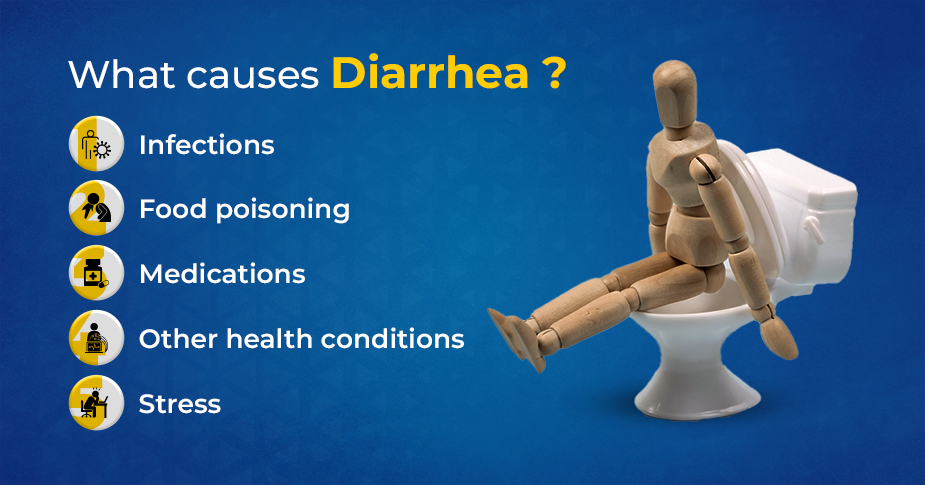
What are the symptoms of diarrhea?
The main symptom of diarrhea is loose, watery stools. Other common symptoms can include:
- Abdominal pain or cramping
- Bloating or gas
- A feeling of urgency to have a bowel movement
- Nausea or vomiting
- Fever
If you are experiencing diarrhea, it is important to drink plenty of fluids to prevent dehydration. Diarrhea can also lead to other complications, such as malnutrition, if not properly managed. If your symptoms are severe or persistent, it is always best to consult a doctor.
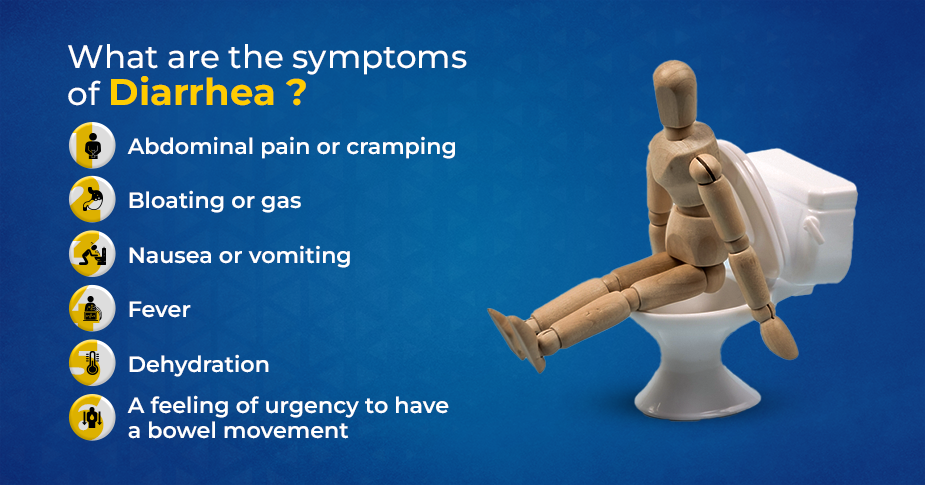
Indications of dehydration in infants and young children:
The signs and symptoms of dehydration in infants and young children can be different from those in adults and may include:
- Having a dry mouth and tongue
- Having few or no tears when crying
- Having sunken eyes or cheeks
- Having a soft spot on the top of the head (fontanelle) that looks sunken
- Having dry or cool skin
- Being lethargic or irritable
- Having little or no urine for several hours
- Having sunken fontanelle (the soft spot on the top of the head)
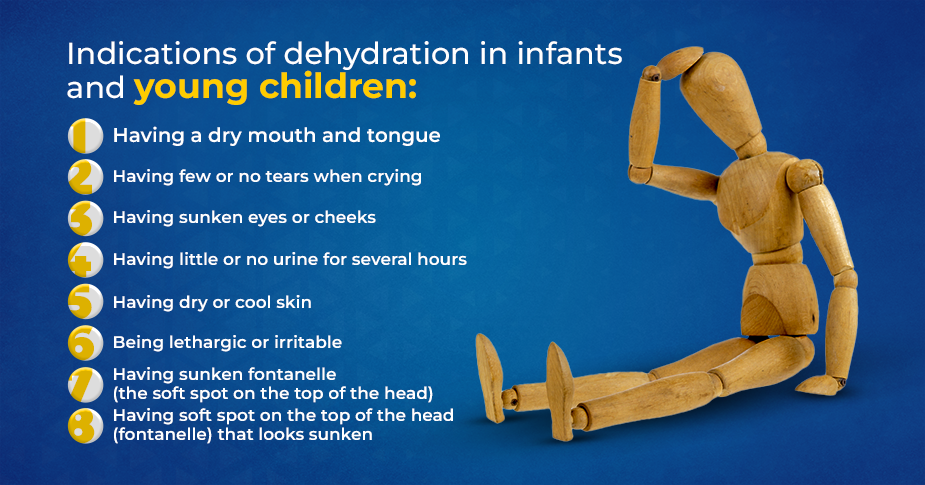
What do I do if my baby or young child has diarrhea?
If your baby or young child has diarrhea, it is important to take steps to prevent dehydration and manage their symptoms. Some general measures that can help include:
- Giving your child plenty of fluids: It is important to replace the fluids that are lost due to diarrhea. Offer your child water, oral rehydration solutions, or electrolyte-rich drinks, such as sports drinks or probiotics (Ready to Drink Probiotics Ospor).
- Offering small, frequent meals: GIve your child small, frequent meals of easy-to-digest foods, such as rice, bananas, toast, and boiled potatoes. Avoid spicy, fatty, or high-fiber foods, as these can irritate the digestive system and worsen diarrhea.
- Avoiding dairy products: Dairy products can be hard to digest and can make diarrhea worse. It is best to avoid them until your child’s symptoms improve.
- Consulting a doctor: If your child’s symptoms are severe or persistent, or if you are unsure how to manage their diarrhea, it is always best to consult a doctor. They can provide more specific treatment and advice, and can also check for any underlying health conditions that may be causing the diarrhea.
Indications of dehydration in adults:
The signs and symptoms of dehydration in adults can include:
- Feeling thirsty
- Having a dry mouth
- Feeling tired or fatigued
- Having dark-colored urine
- Feeling dizzy or lightheaded
- Having dry skin
- Feeling constipated
If you suspect that you or someone else is dehydrated, it is important to rehydrate as soon as possible. This can be done by drinking water or other fluids, such as electrolyte-rich sports drinks.
If you are unsure whether you or someone else is dehydrated, or if your symptoms are severe, it is always best to consult a doctor.
How is diarrhea treated?
The treatment for diarrhea depends on the underlying cause, but some general measures that can help include:
- Drinking plenty of fluids: It is important to replace the fluids that are lost due to diarrhea. Water, sports drinks, and clear broths are good choices. Avoid caffeine and alcohol, as these can worsen diarrhea.
- Using pre and probiotics: Pre and probiotics can improve gut health and can help fight bacterial infections and increase immunity.
- Eating bland, easy-to-digest foods: Avoid spicy, fatty, or high-fiber foods, as these can irritate the digestive system and worsen diarrhea. Instead, choose bland, easy-to-digest foods, such as rice, bananas, toast, and boiled potatoes.
- Consulting a doctor: If your symptoms are severe or persistent, or if you are unable to keep fluids down, it is important to consult a doctor. They can provide more specific treatment and advice, and can also check for any underlying health conditions that may be causing the diarrhea.
- Resting: Diarrhea can be exhausting, so it is important to rest and allow your body to recover.
- Avoiding dairy products: Dairy products can be hard to digest and can make diarrhea worse. It is best to avoid them until your symptoms improve.
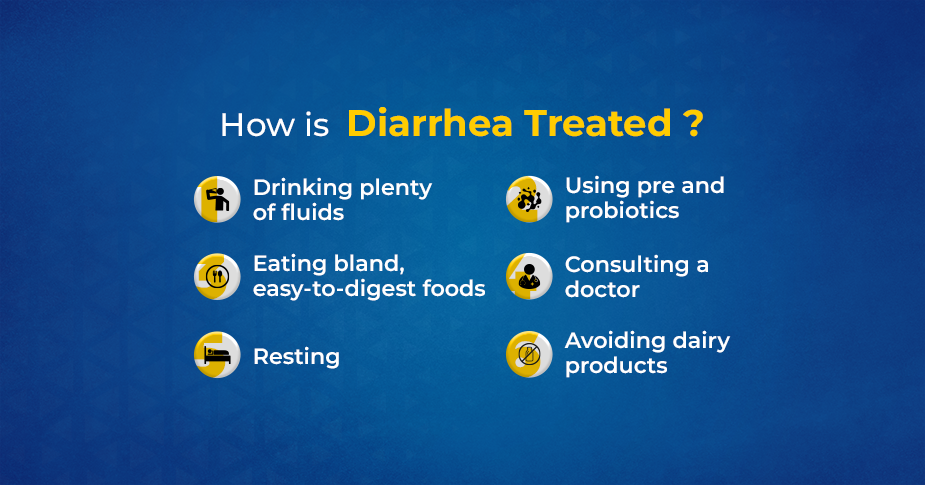
Are there any foods that can help my diarrhea go away?
Yes, there are some foods that can help to alleviate diarrhea. These include:
- Bananas: bananas are a good source of potassium and other electrolytes, which can help to replace those lost due to diarrhea. They are also easy to digest and can help to firm up loose stools.
- Rice: plain white rice is easy to digest and can help to bulk up the stool. It can also help to absorb excess water in the intestines, which can reduce diarrhea.
- Boiled potatoes: potatoes are high in potassium and are easy to digest. They can also help to firm up loose stools.
- Toast: plain, white toast is another easy-to-digest food that can help to firm up the stool. It can also help to absorb excess water in the intestines.
- Applesauce: applesauce is a good source of pectin, a type of fiber that can help to firm up loose stools. It is also easy to digest.
It is important to avoid spicy, fatty, or high-fiber foods, as these can irritate the digestive system and worsen diarrhea. It is also a good idea to avoid caffeine and alcohol, as these can dehydrate the body and make diarrhea worse. If you are unsure what to eat, it is always best to consult a doctor or a registered dietician.

Can antibiotics cause diarrhea?
Yes, antibiotics can cause diarrhea as a side effect. Antibiotics are medications that are used to treat infections caused by bacteria. However, they can also kill off good bacteria in the digestive system, which can lead to diarrhea. This is known as antibiotic-associated diarrhea (AAD).
Can diarrhea be prevented?
Yes, there are some measures that can help to prevent diarrhea. These include:
- Washing your hands regularly: Washing your hands thoroughly and regularly with soap and water can help to reduce the spread of infections that can cause diarrhea. This is especially important after using the bathroom, handling raw food, or coming into contact with someone who is sick.
- Adding pre and probiotics in our diet: Consuming foods or supplements rich in pre and probiotics provide a boost to the immune system and can help fight of bacterial diseases.
- Drinking safe water: Diarrhea can be caused by drinking water that is contaminated with bacteria, viruses, or parasites. To avoid this, it is important to only drink safe, clean water from a trusted source.
- Avoiding contaminated food and drinks: Diarrhea can also be caused by consuming food or drinks that are contaminated with bacteria, viruses, or toxins. To avoid this, it is important to store food properly, cook it thoroughly, and avoid consuming food or drinks from sources that may be contaminated.
- Vaccinating against infections: Vaccines can help to prevent infections that can cause diarrhea. If you are traveling to an area where diarrhea is common, it is a good idea to speak to a doctor about which vaccines may be recommended.
- Avoiding the sharing of food and drinks: sharing food and drinks with someone who has diarrhea can increase your risk of getting sick. It is best to avoid sharing these items to reduce the spread of infection.
Vaccination for Diarrhea:
There are several vaccines that can help to prevent infections that can cause diarrhea. These include:
- Rotavirus vaccine: this vaccine is recommended for infants and young children to protect against rotavirus, a common cause of severe diarrhea in young children.
- Cholera vaccine: this vaccine is recommended for adults who are traveling to areas where cholera is common. Cholera is an infection that can cause severe watery diarrhea and can be life-threatening if not treated promptly.
- Typhoid vaccine: this vaccine is recommended for adults who are traveling to areas where typhoid fever is common. Typhoid fever is an infection that can cause fever, stomach pain, and diarrhea.
It is always best to speak to a doctor about which vaccines may be recommended for you, based on your age, medical history, and travel plans. They can provide more specific advice and can also help to ensure that you are up-to-date on all recommended vaccines.
Complications of diarrhea:
Diarrhea can lead to complications if it is not properly managed. Some of the possible complications of diarrhea include:
- Dehydration: diarrhea can cause the body to lose fluids and electrolytes, which can lead to dehydration. This can cause symptoms such as thirst, dry mouth, dizziness, and dark-colored urine. Dehydration can be serious, especially in infants, young children, and older adults, and it can require hospitalization for treatment.
- Malnutrition: Diarrhea can also interfere with the body’s ability to absorb nutrients from food, which can lead to malnutrition. This can cause symptoms such as weight loss, fatigue, and a weakened immune system.
- Electrolyte imbalances: diarrhea can cause imbalances in the body’s electrolyte levels, which can affect the function of the heart, muscles, and nerves. This can cause symptoms such as muscle weakness, irregular heartbeat, and confusion.
- Infections: diarrhea can sometimes lead to infections in the digestive system, such as Clostridioides difficile (C. diff) or salmonella. These infections can be serious and may require treatment with antibiotics.
If you are experiencing severe or persistent diarrhea, it is important to consult a doctor. They can provide treatment and advice to help prevent complications and manage your symptoms.
When should I call my doctor about diarrhea?
You should call your doctor if you are experiencing severe or persistent diarrhea, or if you are experiencing any of the following symptoms:
- Dehydration: symptoms of dehydration can include thirst, dry mouth, dizziness, and dark-colored urine. If you are unable to keep fluids down or if you are experiencing severe dehydration, it is important to call your doctor.
- Fever: a fever can be a sign of infection, which can sometimes cause diarrhea. If you have a fever of 100.4°F (38°C) or higher, or if you are experiencing other symptoms of infection, such as chills or body aches, it is important to call your doctor.
- Blood in the stool: blood in the stool can be a sign of a serious condition, such as inflammatory bowel disease or colorectal cancer. If you notice blood in your stool, it is important to call your doctor right away.
- Severe abdominal pain or cramping: severe abdominal pain or cramping can be a sign of a more serious condition, such as appendicitis or bowel obstruction. If you are experiencing severe abdominal pain or cramping, it is important to call your doctor.
- Weakness or dizziness: diarrhea can cause the body to lose fluids and electrolytes, which can lead to weakness and dizziness. If you are feeling weak or dizzy, or if you are having trouble standing up or walking, it is important to call your doctor.
If you are unsure whether you should call your doctor, it is always best to consult them for advice. They can provide treatment and advice to help manage your symptoms and prevent complications.
References:
https://www.healthline.com/health/diarrhea
https://www.mayoclinic.org/diseases-conditions/diarrhea/symptoms-causes/syc-20352241
https://www.hopkinsmedicine.org/health/conditions-and-diseases/diarrhea


